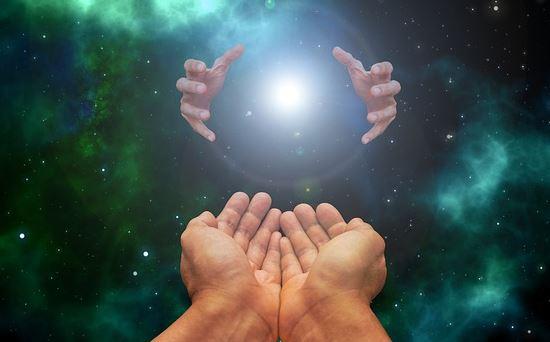Creation Spirituality

Creation spirituality is a spiritual concept that emphasizes the divine origin and presence in creation. It sees the world and the universe not merely as a physical space, but as an expression of divine reality and as a living and sacred space in which God or the Divine is present. This spirituality is often closely linked to ecology, connection with nature, and a deep respect for the earth and all living beings.
Basic principles of creation spirituality:
God as the source of creation: Creation is understood as an explicit manifestation of the divine. In many spiritual traditions, particularly monotheistic religions such as Christianity, Judaism, and Islam, God is viewed as the creator of the world. Creation spirituality sees this world not as something separate from the divine, but as the visible sign of the invisible, eternal Creator.
Sacredness of creation: In this view, the world is not merely material or "ordinary," but sacred. Everything that exists—from the smallest leaf to the farthest stars—carries a divine presence and meaning. This is often symbolized by the idea that the divine spark lives in everything created.
Unity of Humanity and Nature: Creation spirituality often emphasizes a close connection between humans and nature. Humanity is not viewed as rulers of the earth, but as a part of the cosmic whole. In many traditions, humans are seen as stewards or guardians of creation, whose task it is to live in harmony with nature and all living beings and to take responsibility for protecting the earth.
Ecological Responsibility: A central aspect of creation spirituality is environmental awareness and responsibility for the earth. This spirituality promotes respect for nature and encourages ethical living in harmony with natural cycles and processes. It opposes the exploitation and destruction of the natural world and calls on humans to preserve and heal the earth.
Experiences of Transcendence in Nature: In Creation Spirituality, nature is viewed as a source of spiritual experience and insight. Many spiritual practices involve being consciously in nature, such as through outdoor meditation or mindfulness practice in natural environments. In this practice, the presence of the divine is experienced through the beauty and "magic" of nature.
Integral Spirituality: Creation Spirituality is often part of an integral spiritual approach that views all of life as sacred. This means that daily life, interpersonal relationships, work, and personal development are placed in the context of divine creation. All living things are understood as part of a larger, divine plan.
Important Proponents of Creation Spirituality:
Thomas Berry (1914–2009): The Catholic theologian and historian Thomas Berry was an important proponent of Creation Spirituality. He developed a cosmological vision that emphasized the deeper connection between humanity, Earth, and the cosmos. Berry was a passionate advocate of ecology and placed the divine presence in all aspects of nature at the center of his teachings. In his work "The Dream of the Earth" (1988), he called for a spiritual renewal that strengthens awareness of the earth as a sacred space.
Matthew Fox (born 1940): Matthew Fox is a prominent theologian and mystic who placed creation spirituality in the context of the Christian faith. He developed what he called "Creation Spirituality," which emphasizes the mystical and ecological dimensions of creation. In his work, Fox emphasizes that spiritual development and ecology are inextricably linked and that understanding creation as sacred leads to a deeper spiritual practice.
Hildegard of Bingen (1098–1179): One of the most well-known medieval mystics, Hildegard of Bingen had a strongly integrative view of creation. She viewed nature and all creatures as witnesses of God and expressions of divine wisdom. Her visions and writings emphasized the deeper spirituality of nature, which is significant in many of her works, such as her "Visions" and theological writings.
Francis of Assisi (1181–1226): Saint Francis of Assisi is known as the patron saint of the environment and a symbol of creation spirituality. Francis of Assisi viewed all living beings as brothers and sisters and saw himself as a part of creation. In his praise of creation (the "Canticle of the Sun"), he speaks with reverence and love of the natural elements and living beings, viewing them as an Expression of divine love and wisdom.
Practices of Creation Spirituality:
Mindfulness and meditation in nature: People who embrace creation spirituality often practice mindfulness and meditation in nature to experience the divine presence. These practices help establish a deeper connection with the earth and natural processes and raise awareness of the sacredness of creation.
Ecological responsibility and action: An essential part of creation spirituality is ethical action, based on the principle that we as humans are responsible for protecting the earth. This can manifest itself in sustainable lifestyles, avoiding unnecessary consumption, or supporting environmental protection projects.
Gratitude and praise of nature: Many practices include a ritual of gratitude for the gifts of creation, such as daily prayer or meditation, which honors the beauty and richness of nature. Celebrations of nature's cycles, such as seasonal festivals, are also common.
Summary:
Creation spirituality is a spiritual practice that recognizes the divinity in all creation and emphasizes that all life is sacred and interconnected. It calls on humanity to connect with nature, respect it, and take responsibility for its preservation. This spirituality is deeply interwoven with a mystical experience of the divine presence in the world and calls for ethical and ecological responsibility based on the recognition of the sacredness of the Earth.

